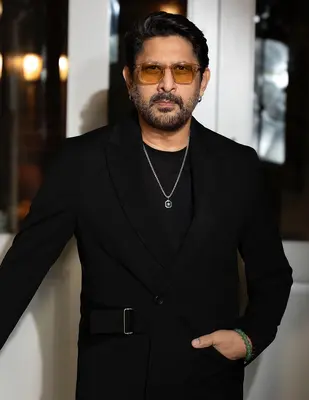When Arshad Warsi logs on to Zoom from his home in Dubai, he looks relaxed, amused even. The city suits him, and the sharp humour remains intact — the same one that made Circuit from Munna Bhai M.B.B.S. (2003) a household name.
Over two decades later, Warsi’s gallery of comic characters — from Golmaal to Dhamaal, and, to an extent, Jolly LLB — has only grown. This year, he found a new generation of fans through Gafoor in Netflix’s The Ba***ds of Bollywood.
Warsi is ecstatic with the response. It's wonderful, he says, referring to the older generation as fans of Circuit, and the newer Gen Zs, as fans of Gafoor. "I’ve managed to satisfy a large age range of people. It feels so good.”
Now, at 57, with Bhagwat Chapter One: Raakshas, the actor has turned a darker page. He plays an angsty cop, unafraid to use his fists, tasked with solving a disappearance case in a small, notorious town.
It wouldn't be the first time Warsi dons the police uniform; you'll find reflections of his character from Sehar (2005), one of his finest films to date.
When asked what made him venture back to this genre after years, he says, "I liked it because I thought the story was good."
When Warsi hears any script, he asks himself if he'd watch it as an audience. "I would never do a film that I personally don’t feel I want to watch," he says, bluntly.
The need for real people, real storiesWarsi doesn’t overthink his choices; for him, a script’s power lies in how it’s told. “That’s why I often ask the writer or director to narrate the story,” he says. “When someone tells you a story, you see it like a picture in your head. Sometimes you go wrong, but more or less, I’ve been right.”
It’s instinct that has guided most of his choices. And that instinct seems to be paying off. That instinct seems to be paying off. In Bhagwat, his character is being embraced by audiences, reaffirming his faith in raw, rooted characters. “Thank God people are loving it,” he says. “Because you know what happens — when you think the script is good and nobody likes it, you start wondering what happened to your judgment.”
Warsi believes audiences are finding their way back to authenticity. He knows, realism is what truly engages a viewer. We've seen such stories on OTT, but the shift, he says, is happening on the big screens, too. "We had moved away from our real stories and real people — everything became superhero. Now, when you see a normal film, it feels good.”
When he says superhero, he doesn't mean humans with superpowers; instead he points out how everything on the big screens seems unrealistic.
“A film must arise some kind of emotion in you — laugh, cry, fear, love. Emotion can only arise when you believe in what you’re watching. If I’m unreal, you won’t believe in me," he says. "That’s where this kind of cinema comes in — where anything can happen, your main guy could lose. Now you feel for him, now you’re invested.”
Leaving darkness on setDespite his comfort with the darker corners of storytelling, Warsi doesn’t take it home. “Between action and cut, I’m completely immersed,” he says. “But before and after, I go out of my way to joke around, to keep things light.”
The reason is simple: emotional hygiene. “You don’t want to stretch that darkness beyond the shoot,” he explains. “When I did Asur, it was heavy. You’re already researching and discussing these dark things — you can’t let that linger. It’s best to forget once you’re done.”

On set, that balance was palpable. His Bhagwat director Akshay Shere, he recalls, would say the atmosphere changed the moment Warsi arrived. “Cracking jokes, having fun, I like that space,” he says.
Opposite Warsi in Bhagwat is Jitendra Kumar — another understated performer. “It’s a tricky role, very easy to go wrong,” he says of his co-star. “The less you do, the better it is — and he did that really well.”
That restraint, Warsi believes, is the essence of believable acting. “I’ve seen it before,” he says, recalling his 2005 cop drama Sehar. “If one performance goes flat, the whole film goes flat. But I loved the way Jitendra played his role in Bhagwat.”
Freedom in streamingStreaming, he admits, has been a gift, especially for writers. “In films, you have two hours to say everything,” he says. “On OTT, you can take your time, say things that maybe a censor wouldn’t allow in cinema. It’s more real.”
But for Warsi, freedom isn’t just about what you can say, it’s about what you choose to do. “Being an actor, I want to do everything,” he says. “Can you imagine doing one kind of role for the rest of your life? It’s depressing. Thankfully, I’ve been accepted in both comedy and drama. Usually when a comic actor does serious work, it feels odd. I’ve been lucky.”
He doesn’t care whether a film is a small indie or a commercial juggernaut — only that it moves him. “A good cinema is good cinema,” he says. “Big budget, small budget — the satisfaction comes from a good script.”
And if it isn't a good script, Warsi would simply say, "Boss, I don't like it."
Wahaj Ali talks acting challenges, diversity in Pakistani dramas, and his Dubai connection Dubai could be the next big acting hub, says leading casting director Mukesh ChhabraYou may also like

Jay Shah's mother and daughter spend time with Harmanpreet Kaur and Smriti Mandhana after World Cup win

J&K's 'Darbar Move': Govt offices start functioning in Jammu

Travel: Tirthan Valley near Kullu is a popular tourist destination, offering trekking and hiking opportunities..

South Korea, US see 'meaningful progress' on conditions for wartime command transfer from Washington

World Sandwich Day 2025: When and who invented this timeless dish? The history is fascinating...






